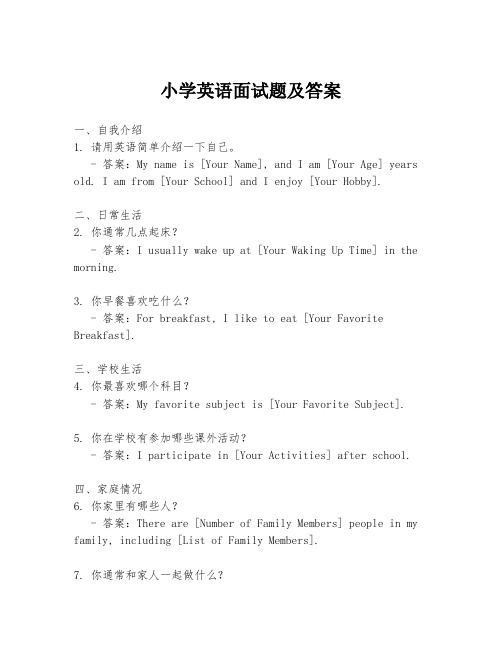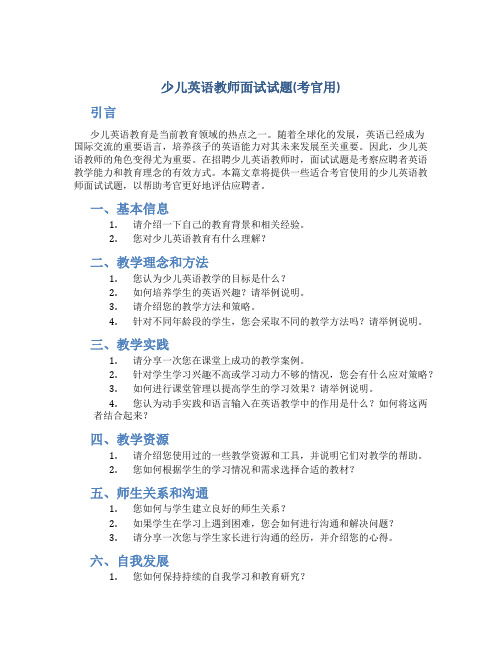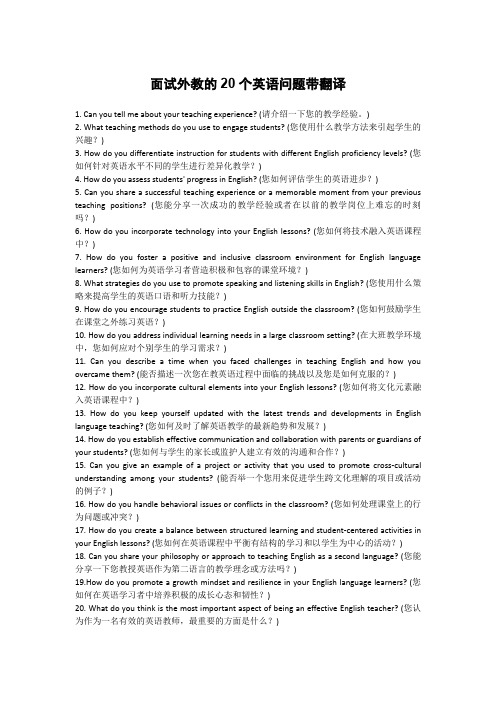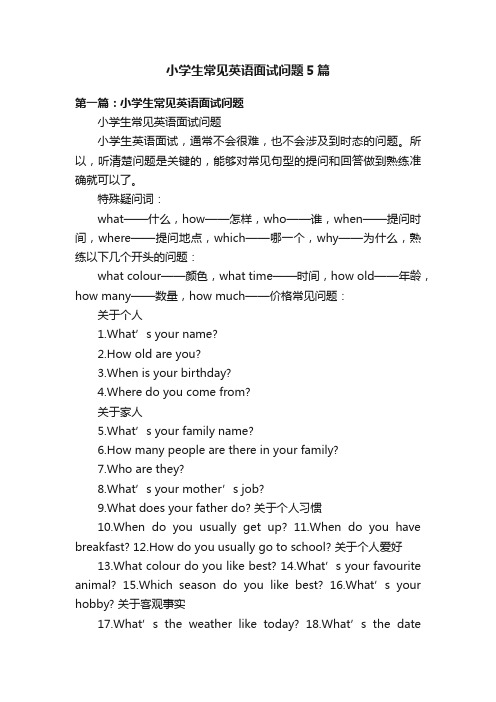少儿英语外教一对一,八大典型英语面试问题及回答
小学英语面试题及答案

小学英语面试题及答案一、自我介绍1. 请用英语简单介绍一下自己。
- 答案:My name is [Your Name], and I am [Your Age] years old. I am from [Your School] and I enjoy [Your Hobby].二、日常生活2. 你通常几点起床?- 答案:I usually wake up at [Your Waking Up Time] in the morning.3. 你早餐喜欢吃什么?- 答案:For breakfast, I like to eat [Your Favorite Breakfast].三、学校生活4. 你最喜欢哪个科目?- 答案:My favorite subject is [Your Favorite Subject].5. 你在学校有参加哪些课外活动?- 答案:I participate in [Your Activities] after school.四、家庭情况6. 你家里有哪些人?- 答案:There are [Number of Family Members] people in my family, including [List of Family Members].7. 你通常和家人一起做什么?- 答案:We usually [Activity You Do with Family] together.五、兴趣爱好8. 你有什么爱好?- 答案:My hobbies are [Your Hobbies].9. 你最喜欢的运动是什么?- 答案:My favorite sport is [Your Favorite Sport].六、节日庆祝10. 你最喜欢哪个节日?- 答案:My favorite festival is [Your Favorite Festival].11. 你通常怎么庆祝这个节日?- 答案:We usually [How You Celebrate the Festival] to celebrate this festival.七、旅行经历12. 你去过哪里旅行?- 答案:I have been to [Places You've Traveled To].13. 你最喜欢旅行的地方是哪里?- 答案:My favorite place to travel is [Your Favorite Travel Destination].八、未来计划14. 你长大后想做什么?- 答案:When I grow up, I want to be a [Your Dream Job].15. 你有什么计划来实现你的梦想?- 答案:To achieve my dream, I plan to [Your Plan toAchieve Your Dream].九、问题解决16. 当你遇到问题时,你通常怎么做?- 答案:When I encounter a problem, I usually [How You Solve Problems].17. 你最近解决了什么问题?- 答案:Recently, I solved a problem by [How You Solved the Recent Problem].十、价值观18. 你认为最重要的品质是什么?- 答案:I think the most important quality is [Your View on Important Qualities].19. 你为什么认为这个品质很重要?- 答案:I believe this quality is important because [Reasons Why You Think It's Important].请注意,以上答案中带有方括号的部分需要根据个人情况进行替换。
少儿英语学习计划面试问题

少儿英语学习计划面试问题Candidate: Thank you for having me, I’m excited to share my ideas with you.Interviewer: Great! Let’s get started. First, can you tell us about your experience with teaching English to young children?Candidate: Of course. I have been teaching English to young children for over 5 years. I have worked with children of various ages and language levels, and have experience in both one-on-one and group settings. I have a TEFL certification and a strong understanding of child development and how to effectively teach English to young learners.Interviewer: That sounds like a solid background. Can you describe your teaching approach and philosophy when it comes to teaching English to young children?Candidate: My teaching approach is interactive, engaging, and fun. I believe that young children learn best when they are actively involved in the learning process and having fun. I incorporate a lot of hands-on activities, games, songs, and storytelling into my lessons to make English learning enjoyable and memorable for the children. I also believe in creating a supportive and nurturing environment where children feel comfortable making mistakes and taking risks with the language.Interviewer: How do you assess the language level of young learners and tailor your lessons to meet their needs?Candidate: I use a variety of assessment tools such as informal observations, checklists, and simple language assessments to gauge the language level of my young learners. Based on the assessment results, I design my lessons to meet their specific needs and language goals.I believe in a student-centered approach, so I always take into consideration the individual strengths, weaknesses, and interests of each child when planning my lessons.Interviewer: That’s grea t to hear. Can you give us an example of a typical lesson plan for young learners?Candidate: Sure. Let’s say I’m teaching a group of 6-year-olds. I would start the lesson with a lively warm-up activity, such as a song or a game to get the children excited and engaged. Then I would introduce new vocabulary and language structures through interactive activities like flashcards, props, or role plays. After that, I would engage the children in a hands-on activity, such as a craft or a project related to the lesson theme. Finally, I would end the lesson with a fun game or a story that reinforces the language learned. Interviewer: It sounds like you have a well-rounded approach to teaching English to young children. How do you incorporate technology into your lessons?Candidate: I believe that technology can be a valuable tool for English learning, even for young children. I use educational apps, interactive whiteboards, and digital resources to enhance my lessons and provide more engaging and interactive learning experiences for thechildren. However, I also believe in striking a balance and not over-relying on technology, as I think hands-on activities and real-life interactions are crucial for young learners’ language development.Interviewer: That’s a good poin t. How do you ensure that parents are involved in their children’s English learning?Candidate: I believe that parental involvement is crucial for the success of children’s language learning. I make sure to communicate regularly with parents about their ch ild’s progress and provide them with resources and tips on how they can support their child’s English learning at home. I also encourage parents to participate in parent-child activities and events related to English learning, so they can see firsthand the progress their child is making and feel more engaged in the learning process.Interviewer: Lastly, can you give us an example of a successful English learning program or project you have implemented for young children?Candidate: One project that comes to mind is a storytelling and drama program I organized for a group of young learners. I worked with the children to create their own stories and then acted them out in a mini theater performance. The children not only had a blast using English in a creative and expressive way, but they also improved their language skills and gained confidence in using English to communicate. The parents were thrilled to see their children’s progress and the children were so proud of their performances. It was a wonderful learning experience for everyone involved.Interviewer: That’s wonderful. Thank you for sharing your insights and experiences with us. We will be in touch soon with our decision.Candidate: Thank you for the opportunity. I look forward to hearing from you. Goodbye. Interviewer: Goodbye, and have a great day!。
面试外教助教的问题及答案

面试外教助教的问题及答案
英语助教面试常见问题:你教了几年书。
你有教学经验吗。
你打算怎么给小朋友上课。
你觉得教小学生跟教初中生有什么不同。
如何让孩子对英文感兴趣。
1、英语助教工作职责:负责安排布置作业,并完成作业的批改;组织学生开展课外活动,丰富学生课余生活;了解学生的学习情况和心理变化,及时向家长沟通学员的学习情况;提高教学质量,完成升学任务等等。
2、面试应该注意的问题和技巧:留心你自己的身体语言,尽量显得精警、有活力、对主考人全神贯注。
带多几份简历前往面试。
初步印象和最后印象。
完整地填妥公司的表格。
谨记每次面试的目的都是获聘。
3、工作中,学历重要还是能力重要?“学历”一直都是一个备受争议的话题,有的说学历不重要,可是学历在默默地影响着我们的生活。
学历晋升虽然高学历有一些优势,但有高学历也不一定就事业成功,考研是具有很强的目的性的,如果你觉得你将来想做的不需要考研,但是你拥有学历的过程中,也要锻炼自己的能力。
【外教面试问题】面试外教问哪些问题

【外教面试问题】面试外教问哪些问题外教面试问题流程参考:1. 面试提问2. 薪资及具体权利义务,学校对教学的要求等。
3. 10分钟准备DEMO4. 10-15分钟DEMO课1.Brife introduction(how do you feel about China &Wenzhou)2.Can you say something about your first job?What did you achieve from it? Why did you leave?2. the second job ……(Working hours group size core value)3. There is nothing be mentioned on your CV between 2006-2011. What did you do?Where?4. Why did you come to China to be teacher not economic?5. You had mentioned a lot about teaching methods,whatkind of new teaching methods do you like,how do you use it in yourclass?6.What is your expectation about the new job?Group size age?Salary?Bonus and so on?7.What is your plan in the coming 3years?针对外教的提问补充:1)What materials have you taught in China?2)How to motivate students when they feel sleepy or get bored?3)Can you handle a low-level class without an assistant? How?4)Do you design games yourself? Describe one game you designed and what kind of lesson the game is suitable for?【外教面试问题】面试外教问哪些问题面试流程Interview Process面试前的准备mdash;阅读简历Before an interview mdash;Screening Resume了解应聘者的意向,比如想要找全职还是兼职,学校还是一对一外教;Find the candidate rsquo;s intention. Does she want afull-time or part-time job, tutoring or teaching?了解应聘者的资历,可根据其国籍、教学经验等;Estimate the candidate rsquo;s value, mainly depending on nationality and teaching experience. 找出需要在面试中询问的问题。
少儿英语教师面试试题(考官用)

少儿英语教师面试试题(考官用)引言少儿英语教育是当前教育领域的热点之一。
随着全球化的发展,英语已经成为国际交流的重要语言,培养孩子的英语能力对其未来发展至关重要。
因此,少儿英语教师的角色变得尤为重要。
在招聘少儿英语教师时,面试试题是考察应聘者英语教学能力和教育理念的有效方式。
本篇文章将提供一些适合考官使用的少儿英语教师面试试题,以帮助考官更好地评估应聘者。
一、基本信息1.请介绍一下自己的教育背景和相关经验。
2.您对少儿英语教育有什么理解?二、教学理念和方法1.您认为少儿英语教学的目标是什么?2.如何培养学生的英语兴趣?请举例说明。
3.请介绍您的教学方法和策略。
4.针对不同年龄段的学生,您会采取不同的教学方法吗?请举例说明。
三、教学实践1.请分享一次您在课堂上成功的教学案例。
2.针对学生学习兴趣不高或学习动力不够的情况,您会有什么应对策略?3.如何进行课堂管理以提高学生的学习效果?请举例说明。
4.您认为动手实践和语言输入在英语教学中的作用是什么?如何将这两者结合起来?四、教学资源1.请介绍您使用过的一些教学资源和工具,并说明它们对教学的帮助。
2.您如何根据学生的学习情况和需求选择合适的教材?五、师生关系和沟通1.您如何与学生建立良好的师生关系?2.如果学生在学习上遇到困难,您会如何进行沟通和解决问题?3.请分享一次您与学生家长进行沟通的经历,并介绍您的心得。
六、自我发展1.您如何保持持续的自我学习和教育研究?2.您认为教师的专业发展应该包括哪些方面?3.您计划如何提高自己的英语教学水平?结语通过以上面试试题,考官可以了解应聘者的教育背景和经验、教学理念和方法、教学实践、教学资源的使用能力以及对师生关系和自我发展的认识等方面。
同时,考官还可以通过应聘者的回答,评估其英语表达能力和教学思维的逻辑性。
通过综合评估,考官可以选择最适合岗位的优秀教师,从而为少儿英语教育提供优质的教育人才。
国际学校入学英语面试问答完善版

第一环节:开场白May I come in? 我可以进来么?Hello,everyone.(微笑,鞠躬) 问好第二环节:Introduce yourself介绍你自己Good morning/afternoon,everyone.My name is xxxx,15 years old this year.I was born in xxxx , zhejiang.I like reading books and playing computer.At the same time ,I love English ,so I want to study here.Thank you for inviting me.第三环节:Question and Answer 问答环节1)Q: What is your name, please? (你叫什么名字?)2)A: My name is xxxx. (我叫xxxx)Q: How old are you? (你几岁了?)A: I am fifteen years old. (我十五岁了)Q: Why you come here? (你为什么来这里?)A: I hope to study in Australia one dayso I come here for interview.(我希望有一天去澳大利亚学习,所以我来参加这个面试)3)Q:Which school are you from? (你是哪个学校的?)A:I’m from No.x middle school. (我来自第x中学)4)Q:What are your hobbies? (你有什么兴趣爱好?)A:I like reading books and playing computer. (我喜欢读书和玩电脑)But I know playing computer too much is bad for me. (但我知道玩电脑太久对我不好)5)Q:What kind of sports do you like most? (你最喜欢什么运动?)A:I love running because I just like the feeling of running.(我喜欢跑步,我喜欢跑步的感觉)Q:What’s your favorite subject? (你最喜欢的科目是?)A:I love Chinese lesson because Chinese teacher is interesting.(我喜欢语文课因为语文老师很有趣)Q:What’s your favorite vegetable? (你最喜欢什么蔬菜?)Q:What’s your favorite animal? (你最喜欢什么动物?)6)Q:What day is today? (今天星期几?)A:It’s Sunday. (今天星期天)Q:What’s the weather like? (今天天气如何?)A:It’s sunny./cloudy/rainy today. (今天是晴天/多云/雨天)7)Q:When do you get up everyday? (你每天几点起床)A:I usually get up at 7 o'clock (我通常7点钟起床)Q:How far is it from your home to the school? (你们家离学校有多远?)A:It's about ten minutes' walk. (走路十分钟)8)Q:What do you do on weekends (你周末都做些什么?)A:I usually read books. (我通常看点书)详细回答例子:Firstly, I usually play computer on Saturday morning, and then I go to thelibrary. Then on Sunday, I get up andusually do my homework.9)Q:How many people are there in your family (你家有多少人)A:My family has four people, father, mother, brother and me.(我家有四个人,爸爸、妈妈、弟弟和我)Q:Who do you like best?(你最喜欢谁)A:I love mombest because she is good to me.(我最喜欢妈妈因为她对我很好)Q:Do you help your mother with the housework? (你有帮妈妈做家务么)A:Yes,sometimes I help my mom sweep the floor.Important topic 重要话题1)festival 节日Q: What’s your favorite festival? (你最喜欢的节日是)A:My favorite festival is National Festival. I went to HONGKONG Disneyland with my parents last year. There are many interesting things such as MICKY.(我最喜欢的节日是国庆,去年国庆我和爸爸妈妈去了迪士尼乐园,这里有很多有趣的东西比如米奇。
面试外教的20个英语问题带翻译

面试外教的20个英语问题带翻译1. Can you tell me about your teaching experience? (请介绍一下您的教学经验。
)2. What teaching methods do you use to engage students? (您使用什么教学方法来引起学生的兴趣?)3. How do you differentiate instruction for students with different English proficiency levels? (您如何针对英语水平不同的学生进行差异化教学?)4. How do you assess students' progress in English? (您如何评估学生的英语进步?)5. Can you share a successful teaching experience or a memorable moment from your previous teaching positions? (您能分享一次成功的教学经验或者在以前的教学岗位上难忘的时刻吗?)6. How do you incorporate technology into your English lessons? (您如何将技术融入英语课程中?)7. How do you foster a positive and inclusive classroom environment for English language learners? (您如何为英语学习者营造积极和包容的课堂环境?)8. What strategies do you use to promote speaking and listening skills in English? (您使用什么策略来提高学生的英语口语和听力技能?)9. How do you encourage students to practice English outside the classroom? (您如何鼓励学生在课堂之外练习英语?)10. How do you address individual learning needs in a large classroom setting? (在大班教学环境中,您如何应对个别学生的学习需求?)11. Can you describe a time when you faced challenges in teaching English and how you overcame them? (能否描述一次您在教英语过程中面临的挑战以及您是如何克服的?)12. How do you incorporate cultural elements into your English lessons? (您如何将文化元素融入英语课程中?)13. How do you keep yourself updated with the latest trends and developments in English language teaching? (您如何及时了解英语教学的最新趋势和发展?)14. How do you establish effective communication and collaboration with parents or guardians of your students? (您如何与学生的家长或监护人建立有效的沟通和合作?)15. Can you give an example of a project or activity that you used to promote cross-cultural understanding among your students? (能否举一个您用来促进学生跨文化理解的项目或活动的例子?)16. How do you handle behavioral issues or conflicts in the classroom? (您如何处理课堂上的行为问题或冲突?)17. How do you create a balance between structured learning and student-centered activities in your English lessons? (您如何在英语课程中平衡有结构的学习和以学生为中心的活动?) 18. Can you share your philosophy or approach to teaching English as a second language? (您能分享一下您教授英语作为第二语言的教学理念或方法吗?)19.How do you promote a growth mindset and resilience in your English language learners? (您如何在英语学习者中培养积极的成长心态和韧性?)20. What do you think is the most important aspect of being an effective English teacher? (您认为作为一名有效的英语教师,最重要的方面是什么?)。
小学生常见英语面试问题5篇

小学生常见英语面试问题5篇第一篇:小学生常见英语面试问题小学生常见英语面试问题小学生英语面试,通常不会很难,也不会涉及到时态的问题。
所以,听清楚问题是关键的,能够对常见句型的提问和回答做到熟练准确就可以了。
特殊疑问词:what——什么,how——怎样,who——谁,when——提问时间,where——提问地点,which——哪一个,why——为什么,熟练以下几个开头的问题:what colour——颜色,what time——时间,how old——年龄,how many——数量,how much——价格常见问题:关于个人1.What’s your name?2.How old are you?3.When is your birthday?4.Where do you come from?关于家人5.What’s your family name?6.How many people are there in your family?7.Who are they?8.What’s your mother’s job?9.What does your father do? 关于个人习惯10.When do you usually get up? 11.When do you have breakfast? 12.How do you usually go to school? 关于个人爱好13.What colour do you like best? 14.What’s your favourite animal? 15.Which season do you like best? 16.What’s your hobby? 关于客观事实17.What’s the weather like today? 18.What’s the datetoday? 19.What day is it today?20.How many seasons are there in one year?面试时还会遇到话题讨论,其实,也就是关于以上常见问题的汇总,例如: T opic:Tell me something about yourself, your family, your school,one day of your life, your holidayYour favourite animal, your bedroom, your hobby, your favourite season,What will you do if you have a lot of money? What do you want to be in the future?能想到的暂时只有这么多。
- 1、下载文档前请自行甄别文档内容的完整性,平台不提供额外的编辑、内容补充、找答案等附加服务。
- 2、"仅部分预览"的文档,不可在线预览部分如存在完整性等问题,可反馈申请退款(可完整预览的文档不适用该条件!)。
- 3、如文档侵犯您的权益,请联系客服反馈,我们会尽快为您处理(人工客服工作时间:9:00-18:30)。
少儿英语外教一对一,八大典型英语面试问题及回答
Type 1: “Why did you decide to seek a position in this company?”
“You are a top company and I am convinced there would be no better place to work. You provide your employees with an open working environment based on team work.”
Typ e 2: “Why did you leave your last job?”
(Hint: Don’t lie and don’t speak badly of your past employer)
“I felt there was a lack of potential for upward mobility, I needed a more challenging job”
Type 3: “How would you describe your ability to work in a team?”
”As part of my college basketball team I learned we must work together. My individual training in the gym contributed to the team’s overall success. I like a mix, with a group I get the group input, but some projects are done better if just one person i s working on them”
Type 4: “What skills have you developed in your previous roles?”
“During my internship I worked for a few days in each of the departments of a company. This gave me a great insight into management techniques and how a big organisation wo rks”
Type 5: “Would you be willing to travel in this job?”
“I understand that in order to build a good long term relationship with our customers it sometimes necessary to travel. I am more than willing to do this”
Type 6: “Describe your leadership skills?”
“It is important to take everyone’s opinion into account and give them the opportunity to excel. My role, as I see it, is organise and get things in order”
Type 7: “What suggestions do you have for our organisation?”
“Looking at your website, and comparin g it with those of your competitors, I think you should streamline the site and emphasis the recent upgrades to your products”
Type 8: “What’s the biggest mistake you’ve made?”
“Taking for granted the huge sacrifices my parents made, so that I could succee d. I now do everything I can to make them proud of me”
很多很多红屋顶的房子排在一起,
是不是很壮观?Ella saw many of these houses in Prague.She thought she was in a fairy world.这些红顶屋遍布于布拉格的
老城区。
Most of the houses are hundreds of years old.They tell the history of the city.
有条河从布拉格城里流过,它就是伏尔塔瓦河。
The river flows quickly and floods almost every year.洪水在建筑物上留下的水渍现在还能见到。
Sometimes, floods severely damage some houses.可是,为什么这些房子现在还保持得很好呢?
Because people spend a lot of time restoring them.
They love these houses, and hope to keep them forever.
总共有十七座桥架在伏尔塔瓦河上,其中最着名的是
查理士大桥。
The bridge has a history of more than 700 years.
像北京的卢沟桥一样,查理士大桥也有很多雕像。
They are not stone lions,?
but 30 stone people.据说这些雕像可以保护布拉格城。
布拉格老城的广场上有一座古老的钟楼。
这个钟分上下两层,下边的钟用于报时。
12 puppets come out to dance on time.上边的钟则用于月圆月缺。
仔细研究一下,
你能看明白吗?The clock was built in 1410.It is still working well now. 真是不容易啊!。
